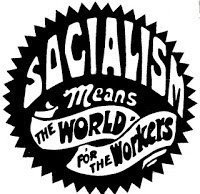The “trade-union republic” was conceived by the immediate predecessors of the Chartist movement: the construction worker James Morrison and his friend, the writer James Smith. While the advanced workers of the period were only beginning to feel the need to win political power and for this purpose to achieve universal suffrage, Smith wrote in his
journal The Crisis on 12 April 1834:
“The only House of Commons is a House of Trades [unions]. . .We shall have a new set of boroughs when the unions are organised: every trade [union] shall be a borough, and every trade [union] shall have a council of representatives to conduct its affairs. Our present commoners know nothing of the interests of the people, and care not for them. . . . The character of the Reformed Parliament is now blasted [discredited], and . . . is not easily recovered. It will be replaced with a House of Trades.”
In the same period, Morrison wrote in his publication The Pioneer, 31 May 1834: “The growing power and growing intelligence of trades unions . . . will become, by its own self-acquired importance, a most influential, we might almost say dictatorial, part of the body politic. When this happens we have gained all that we want: we have gained universal suffrage, for if every member of the Union be a constituent, and the Union itself becoming a vital member of the State, it instantly erects itself into a House of Trades which must supply the place of the present House of Commons, and direct the industrial affairs of the country, according to the will of the trades. . . .With us, universal suffrage will begin in our lodges, extend to the general union, embrace the management of trade, and finally swallow up the political
power.”
Substitute “soviet” for “union,” workers’ councils “council of representatives,” “Industrial Congress” for “House of Trades,” and you have an outline of the “syndicalist system” established on the basis of productive units.
Bronterre O’Brien, who later was prominent in the Chartist movement, wrote in his newspaper Poor Man’s Guardian:
“Universal suffrage does not signify meddling with politics, but the rule of the people in the state and municipality, a Government therefore in favour of the working man.”
James Elishama Smith (1801-1857) was born near Glasgow in Scotland. John Saville describes him as “editor of the weekly Crisis, the main Owenite journal, from the autumn of 1833 until its demise in August 1834.” Timothy Stunt suggests that he is the person behind the pseudonym Senex, who in 1834, wrote “a series of ‘Letters on associated labour’ in James Morrison’s Pioneer.” Saville, “JE Smith and the Owenite Movement, 1833-1834,” 115; Timothy C. F. Stunt, “Smith, James Elishama [Called Shepherd Smith].”
James Morrison (1802-1835), born in Newcastle upon Tyne in Britain, was also a follower of Robert Owen. In 1832 he launched a weekly newspaper, The Pioneer. When Morrison became a member of the executive of the Grand National Consolidated Trades Union (GNCTU) in 1834, The Pioneer became that organisation’s newspaper, the “circulation of which at its peak may have reached 30,000 copies.” John Rule, “Morrison, James (1802–1835), Journalist and Trade Unionist.”
Smith and Morrison were remembered by the Russian revolutionary Julius Martov yet forgotten by many in the British labour movement.


No comments:
Post a Comment